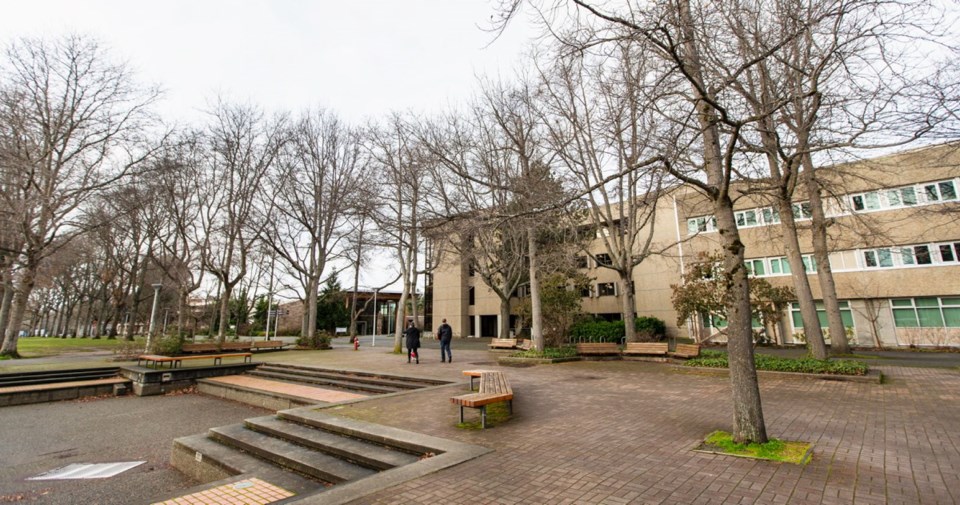A growing chorus of university and college students on Vancouver Island is calling for tuition-fee reductions, saying they’re not receiving the same quality of education through online programs.
The University of Victoria, Royal Roads University, Camosun College and Vancouver Island University have all said that the majority of classes will take place online this fall. However, some on-campus research, labs, practicums and experiential learning could take place as long as physical distancing can be maintained.
Aaron Elsser, a fifth-year mechanical engineering student at UVic, said he has been struggling to complete his course work without access to the computer-aided design programs he typically accessed on more powerful computers in the engineering lab.
“They actually raised the price of tuition for the summer semester and fall and students don’t have access to any of the services we’re used to,” Elsser said. “We’re still playing full price even though we don’t have access to computer labs, we don’t have access to face-to-face learning. We’re getting a quarter of the service.”
The 21-year-old’s summer co-op position at a Victoria engineering firm has been postponed due to COVID-19, which means he’ll have to take out more student loans.
UVic undergraduate and graduate students saw a two per cent tuition increase for the 2020-21 academic year and international undergraduate students saw a 3.75 per cent increase, said university spokesman Paul Marck. He confirmed fees will not change as a result of online programming.
“We continue to provide high-quality academic programs and services by the same experienced faculty and staff while keeping health and safety the centre of our decision-making,” Marck said in an email. “Online instruction and delivery of services do not mean reduced costs for the university.”
The university, Marck said, has made significant investments in technology for collaborative platforms, additional bandwidth and support services. The university is also hiring more teaching assistants and sessional instructors to provide one-on-one online support for students, he said. Students are still able to remotely access academic advising, counselling, international student supports and health services, Marck said.
The university is disbursing $1 million to students facing financial hardship as a result of the pandemic through the COVID-19 Support Bursary Fund.
Students studying online in the fall term will not be charged the athletics and recreation fee, which is $90.66 per semester, he said.
Puneet Kaur, Camosun College Student Society’s executive for the Interurban campus, said she’s heard from many students who would like to see a drop in tuition fees.
Many students are struggling with the online format and would benefit from face-to-face interactions with professors, she said.
Kaur, a first-year business administration student from India, said international students face higher tuition fees, coupled with the high cost of living in Victoria.
A one-time $1,000 grant toward tuition was given to international students for the summer semester, because many were not able to access federal emergency funding. International students are ineligible for the Canada Emergency Student Benefit; it offers $1,250 per month between May and August to post-secondary students and recent graduates who have lost income or summer jobs due to COVID-19.
“We discovered that the vast majority of international students at Camosun didn’t go home and had not budgeted for a summer semester,” Camosun College spokesman Rodney Porter said
Porter said Camosun employees are working to ensure online course delivery does not affect the quality of education. Limited on-campus learning is available to students who need access to specialized equipment or face-to-face instruction, such as those in trades, technology or health care, he said.
All student services, including recreational activities such as Zumba and campus clubs, have been offered virtually, Porter said.
Vancouver Island University in Nanaimo, which is offering a hybrid of online courses with some limited on-campus access, will not be adjusting fees. VIU students also faced a two per cent tuition increase this year.
“The university is re-imagining and redesigning our courses, programs and support services to recognize and adapt to the current pandemic, and the costs associated with program delivery have not been reduced,” VIU’s provost and vice-president academic Carol Stuart said in a statement.
“Tuition supports our ability to provide an enriching, student-centred education, and deliver our academic services, as well as provide other supports and services to students such as counselling, advising, research assistance, library services and IT support.”
The university has also created a student emergency bursary for those affected financially by the pandemic.
Alexandra Boucher-Carter, a third-year biomedical engineering student at UVic, and president of the Engineering Students Society, said if tuition fees cannot be lowered, she welcomes additional services, such as the hiring of more teaching assistants to ensure students are getting a high-quality online learning experience.
In a statement, the Ministry of Advanced Education, Skills and Training said it will “continue to listen to [students] to ensure they are getting the post-secondary education that all British Columbians expect from our public post-secondary institutions.”
The ministry said it has dedicated $3.5 million to help students with unanticipated emergency needs and $1.5 million for Indigenous student supports. kderosa@timescolonist.com



